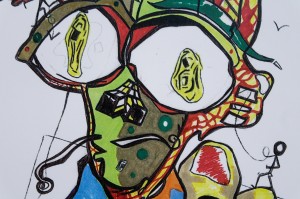“Obsurd”: Abstract Urban Art by Michael Ward
A new art exhibit at Ebling Library displays the dynamic, vibrant, and abstract work of Michael Ward. Titled Obsurd: Abstract Urban Art by Michael Ward, the space contains over 40 pieces of the artist’s work and provides an insight into his experiences through the creative use of felt tip marker, pen, and pencil. Micaela Sullivan-Fowler, exhibit curator at Ebling Library, describes his work as:
“Graffiti-like in its vibrancy, Picasso-like in it abstractions; for all the edges and borders, the characters feel fluid and vibrant, accommodating and inviting…I wish you could hear Michael talk about each piece; the music, relationships, symbolism, and history that influences his artwork and has brought him to this point in his creative landscape.”
Originally from New York, and currently residing in Madison with his family, Ward has transcended the difficulties in his life. Diagnosed with Cerebral Palsy “due to a traumatic brain injury resulting from a car accident when he was being driven home from the hospital immediately after birth,” he has faced many obstacles, but sees his diagnosis as a “challenge and not a disability.” Along with developing his skills over numerous years of practice, Ward acknowledges the inspiration his parents, both artists, provided him as a child:
“It was always an adventure tracing over the lines of my mother’s drawings…objects and shapes became a big part of my world [and]…as time went by I was more in tune with myself and ready to expose my artwork.”
He indicates that his “drawings speak for themselves, only [the viewers’] true eyes can understand the theory behind my madness…each of us may see different things, it is what you see; it is ‘obsurd’.”
At the heart of the exhibit lies a passion for curiosity, connection, and even bit of serendipity, both from Ward and Sullivan-Fowler.
Meeting in the most unconventional of locations in early spring, Sullivan-Fowler began a brief conversation at a local grocery store with fellow shoppers, one of which happened to be Ward. It was not until one of Ward’s family members coincidentally alluded to his work at the store’s checkout line that curiosity and serendipity intertwined. The ensuing checkout line conversation, coincidental in its own right, would lead to a series of e-mails over several months, and eventually an opportunity for Ward to showcase his work in his first art gallery exhibit.
Sullivan-Fowler highly praises Ward and his work, and considers him to be a “perfect package” for Ebling Library. Embodying the value of art as an important component of a healthy lifestyle, education, and cultural heritage, his talents speak to the vision that Sullivan-Fowler seeks for the space. And her vision is layered.
Along with providing a public venue for the artist to express their work, she indicates the value that students place on the exhibit space. They often mention that the “interesting and dynamic art help brighten their day” and “benefits and relaxes them, many of whom spend eight or more hours studying at Ebling Library.”
These fascinating exhibits, envisioned by the artist, coordinated by Sullivan-Fowler and installed by UW Hospital’s Sarah Grimes, provide a welcome diversion for visitors and students. They are the result of an often serendipitous combination of curiosity, opportunity and esthetic. Come see the “voice” of Michael Ward.
The Obsurd: Abstract Urban Art by Michael Ward exhibit runs until Friday, September 12th, 2014. A selection of colored prints will be available for purchase. Additional prints may be requested with notice.
Questions about the event or the show: contact Micaela Sullivan-Fowler msullivan@library.wisc.edu or 608-262-2402.




